#Seeing Reds
Text
"The most notorious internee held in any of the Canadian [internment] camps was Leon Trotsky. When news reached North America in March 1917 that the Russian tsar, Nicholas II, had abdicated, Trotsky was living in exile in New York City. He immediately arranged to return to his homeland. On March 27 he boarded the Norwegian freighter Christianiafjord with his wife and two sons, bound for Petrograd. Trotsky had been under surveillance in New York where British authorities took note of his departure. The situation in Russia was confused, but the Allies knew that socialists like Trotsky wanted to withdraw Russian troops from the war. It was widely believed that they were enemy agents funded by the Germans to divide the Allied war effort. At Halifax, the British naval commander received orders to board the Christianiafjord when it arrived and to detain Trotsky and the other Russians with whom he was travelling.
On April 1 the freighter steamed into Halifax harbour. Naval officers marched Trotsky and his comrades to jail cells in the Citadel, the imposing stone fortification overlooking the city. Then, while Natalia Sedova Trotskaya and the boys were lodged with a police employee in town, the men were interned in a prisoner-of-war camp, a converted iron foundry at Amherst near the New Brunswick border.
Trotsky was not cowed by his treatment. Quite the opposite: he defiantly petitioned the Russian government and the British prime minister, protesting his illegal detention. Meanwhile, he began to harangue his fellow prisoners with speeches, in fluent German, proclaiming the need for a revolution in Germany. “That month the concentration camp very much resembled a perpetual mass meeting,” he later wrote. To the dismay of officials, he became a hero to the 800 other detainees. He was “by far the most popular man in the whole camp,” the commander reported. Another officer recalled that Trotsky “gave us a lot of trouble at the camp, and if he had stayed there any longer [...] would have made communists of all the German prisoners.”
Trotsky was a citizen of a country with which Great Britain, and therefore Canada, was an ally in the fighting, and he was travelling with perfectly legal permits and visas. His internment was giving Canada a black eye internationally. At rallies in New York and Russia, speakers denounced Canada as a tyranny, no better than the Tsarist autocracy. Finally, after a month in confinement, he won his release. A crowd of cheering prisoners lined his path as he walked to the gate, followed by an impromptu camp band doing its best to play the Internationale. And with that, Leon Trotsky’s sojourn in Canada ended."
- Daniel Francis, Seeing Reds: the Red Scare of 1918-1919, Canada’s First War on Terror. Arsenal Pulp Press, 2011. p. 17-18.
#world war 1 canada#world war 1#russian revolution#halifax#leon trotsky#internment camps#prisoner of war camp#iron heel#canada in the british empire#political prisoners#canadian history#seeing reds#reading 2024#research quote#anti-communism#communists
14 notes
·
View notes
Text
Batman gives each of his Robins a different code to use when they’re in trouble and need immediate extraction. He promises that when they call, he’ll drop everything just to get to them, come hell or high water.
Jason, during his time with the League, shares his code with Damian, to be used “only in the direst of circumstances, when you have exhausted all other options.” He doesn’t know if Bruce will answer, given how fractured their relationship was before he died, but it is better than nothing. Every tool counts when they live such dangerous lives.
Damian uses it exactly once, and Bruce, who still feels the loss of his son like a yawning chasm in his chest, responds to it even though he knows it can’t be Jason because Jason’s dead. What he finds, instead of Jason, is a boy in League garbs, drenched in blood from the tips of his midnight-black hair to his too-small feet, with a face that Bruce sees himself and Talia in, requesting asylum from a grandfather who wishes to possess his body. Bruce doesn’t question how this boy who is so clearly his son knew the code. Talia al Ghul is resourceful and places family above all; the code is not beyond her abilities to discover, and she is not above using Bruce’s desperate love for his dead son to ensure that hers does not meet the same fate.
Bruce takes Damian in, because of course he does, and since Jason is dead he allows Damian to keep using the code. After all, it’s not like Jason is alive to use it, right? If someone uses the code, there’s no one it could be but Damian, right?
The next time the code is used, Bruce traces the location to Gotham even though Damian was supposed to be in Bludhaven visiting Dick. But whatever happened that resulted in Damian being in Gotham can wait, because he has already failed one son and he will not fail another, his son is in trouble and he needs to get to him, he needs to—
What he finds, instead of Damian, is a boy (just eighteen, too young, but also too old, but also he will always be a boy to him) in League garbs, drenched in blood from the tips of his midnight-black hair to his too-large feet (when had he gotten so big), wearing the face of his dead son.
(Who, maybe, just maybe, may no longer be so dead.)
#Jason sees Bruce answer his code with such desperation and thinks that maybe Bruce still loves him just a little#maybe he doesn’t need revenge maybe he can just go home#maybe when HE calls it instead of Damian Bruce will come get him too#and because of that there’s no red hood in this au#even though I love crime Lord red hood Jason#maybe he can still be a crime lord idk just not one called red hood who baited Batman into choosing between him and joker#Bruce Wayne#Jason Todd#Damian Wayne#Batman#DC#DC comics#DCU#Batfam#Robin#DC Robin#notfic
15K notes
·
View notes
Text




patrol is fun :DD
#akpsdj this took so long#NOT SHIP ART !!!!!#stephanie brown#steph brown#spoiler#jason todd#red hood#dick grayson#nightwing#yes nightwing is supposed to be in that peter griffin death pose#damian wayne#robin#dc fanart#illustration#batfamily#batfam#batman#dc comics#ash's doodlings#tw food#u can see the progression of my tiredness lmao#the first one panel is so detailed compared to the last one
26K notes
·
View notes
Text
by far the harshest truth ive ever had to come to terms with is that many people genuinely have absolute dogshit taste and that is, technically, not a crime
#ITS NOT A CRIME ITS NOT A CRIIIIIIIME i scream to myself#before forcibly clicking away from a post that made me see red because someone said they liked a book i thought was an insult#to the concept of reading
24K notes
·
View notes
Text

Saw these panels the other day and—

LET JASON BE SILLY YOUR HONOR
He knows he won’t no balls
#batman#dc#red hood#jason todd#bruce wayne#I know Tim drop kicks Bruce right after the panels but I couldn’t help but see this#let Jason be funny dc#like cmon#it was set up right there#how could he not#like no balls#you won’t#admittedly Bruce does something worse but still#let hi#be silly your honor#he’s but a little guy
14K notes
·
View notes
Text
Another reason why I’m a firm believer in letting Bruce get old is because the idea of him looking and his dark haired children without his glasses on and genuinely not being able to tell them apart is unparalleled
#i can clearly see him staring at one of the kids and deciding to just play roulette#bruce internally while not wearing glasses: dick?cassie?jay?tim?damian?dick?cassie?jay?tim?damian?dick?cassie?jay?#bruce finally making a choice: tim can you grab that file#jason: i’m disowning myself again#dc comics#batfamily#batfam#batman#nightwing#orphan#black bat#red hood#red robin#robin#bruce wayne#dick grayson#cassandra cain#jason todd#tim drake#damian wayne
22K notes
·
View notes
Text
I need a fic where robin!jason is the only one to notice baby stalker tim while they’re out on their patrols and it gets to the point where he’ll occasionally address him when he’s alone & around the others and they think he’s low-key going insane
fast forward a couple years and tim refers to something he saw while he was stalking batman and robin and jason’s head just WHIPS towards bruce and starts screeching “I TOLD YOU I WASN’T HALLUCINATING THE TINY STALKER CHILD FOLLOWING US B!! I FUCKING TOLD YOU I-“ and he has to be dragged out of the room by nightwing, still loudly proclaiming his vindication while tim and the others just watch on with the pikachu meme face
#i can see vison in my head pls tell me y’all can too#jason is dramatic enough that he wouldn’t let this go for MONTHS#dc#batman#jason todd#dick grayson#bruce wayne#batfam#tim drake#robin#red hood#red robin
9K notes
·
View notes
Text

Yeah
#I saw this and screen shot it specifically for the masses on here to see#dc#dc comics#batfam#bruce wayne#batman#dick grayson#nightwing#cassandra cain#batgirl#orphan#black bat#jason todd#red hood#robin#sass speaks
6K notes
·
View notes
Text
Bruce gets knocked over the head with a lead pipe and without even looking at eachother dick and Tim start circling around him making tweeting noises
Meanwhile bruce wishes the hit actually knocked him out so he didn’t have to witness his kids acting like this
#dick grayson#Nightwing#Tim Drake#Bruce Wayne#Red Robin#Batman#dc#if you don’t get it#it’s a joke based on that moment in cartoons where a character gets hit in the head and “sees stars”#a lot of the time there’s birds flying around in circles over the characters head too#to signify that their head is spinning and that they’re dizzy/disoriented#usually swatted away by the newly angered character
10K notes
·
View notes
Text
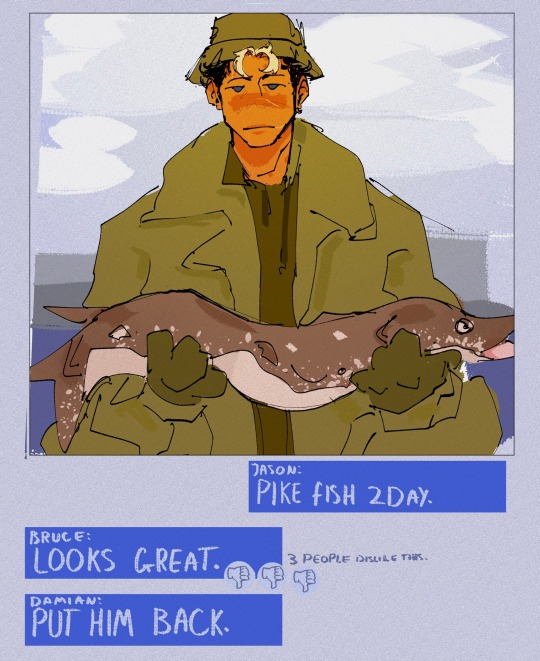
was suddenly overcome with the inexplicable urge to draw jason fishing
#dc#my art#jason todd#batfamily#batman#dc fanart#dc comics#red hood#possibly the silliest looking thing you will ever see uploaded on my tumblr blog
15K notes
·
View notes
Text
"Police commissioner Perry decided to invite three of the “Revolutionary Socialists” to a secret meeting to get a sense of their intentions. Victor Midgley, Bill Pritchard, and Jack Kavanagh were all stalwarts of the Socialist Party of Canada from British Columbia. Midgley was the union official beaten by veterans during the sympathetic strike in Vancouver the previous August. He was one of the main organizers of the Calgary conference, which named him secretary of the One Big Union central committee. Pritchard joined him on the central committee. With his spectacles and a quiff, he had more the appearance of a mild-mannered school teacher than a longshoreman on the Vancouver waterfront. But Pritchard was a fire-and-brimstone orator who had played a pivotal role planning the Calgary conference, then guiding its debate. He would later serve a year in prison as one of the convicted leaders of the Winnipeg General Strike. Kavanagh, also a longshoreman and newly installed as the president of the BC Federation of Labour, was in charge of the committee that was meant to proselytize in favour of the One Big Union [OBU] in British Columbia.
In the report of the meeting that Perry made to his superiors, he described the trio of Reds as “intelligent, well-read men.” “They are tireless in pursuit of their objects,” he wrote, “and have all the fervour of fanatics.” He did not think they were plotting a violent overthrow of the government, but he feared them nonetheless.
I am not prepared to say that they are aiming at a revolution in the ordinary sense of that word, but I do say that they are influencing a section of labour in the West and unchaining forces which, even if they so desire, some day they will be unable to control. Here is grave danger to the peace and security of the country.
Even so, Perry urged caution. He feared that repressive measures would simply radicalize the more moderate members of the labour movement. Returning to the subject of armed revolution, he observed that “it can only succeed if a considerable number of returned soldiers join the movement.” The Reds knew this and were doing their best to court the veterans. He urged the government, therefore, to promote full employment and whatever other policies it could to placate the grievances of the soldiers.
Another crucial document influencing government thinking about the labour situation was a “Memo on Revolutionary Tendencies in Western Canada” prepared in early April by C.F. Hamilton. Hamilton was a former journalist (he covered the Boer War for the Toronto Globe) and wartime press censor. He had been assistant comptroller of the Mounted Police before the war and rejoined the Mounties afterward as an intelligence officer. He was a highly influential official within the force who reported directly to the commissioner. In his thirteen-page memo, Hamilton argued that there was a small but active band of revolutionaries at work in western Canada attempting to subvert the Canadian government.
Their openly avowed aim is to procure the establishment of a Soviet government, with its concomitants of the disappearance of parliamentary government, the subversion of the rule of the majority, the abolition of private ownership of property, and the destruction of the other institutions upon which society is founded.
Hamilton admitted that armed insurrection seemed unlikely in Canada, but he argued that there were circumstances in which it could occur. The key was the troubled labour situation, he said, and he sketched out a plausible scenario for the “would-be revolutionists.”
What they aim at is an intense conflict between labour and capital, embittered by riots and bloodshed; they calculate on a general dislocation of the industrial system, passing into an uprising of the working classes, probably reinforced by masses of discontented returned soldiers. The whole project turns upon the propagation of bad temper and mutual hate between classes …
Despite his dire prognosis, Hamilton did not believe that direct repression was the correct response. Instead, he called for a campaign of counter-propaganda highlighting the failure of Bolshevism to bring social peace and prosperity to Russia.
As alarmist reports piled up on the desks of senior ministers in Ottawa, the acting prime minister, Sir William Thomas White, panicked. White, a Montreal financier who had won his seat in Parliament in the 1911 election as an opponent of freer trade with the United States and had been rewarded with the finance portfolio in cabinet, was filling in for Prime Minister Borden who was still away at the peace negotiations in Europe. He cabled the absent prime minister in mid-April with the news that Bolshevism was rampant in Canada among soldiers and workers, especially in British Columbia. There was a revolution brewing, White reported, and he wanted Borden to ask the British government to dispatch one of its warships to Vancouver where “the presence of such ship and crew would have steadying influence.” Borden was in Paris hobnobbing with heads of state, making the world safe for democracy. He was impatient at White’s bothering him with what no doubt seemed like petty, and exaggerated, domestic problems. “I would very much like to reply, For Heaven’s Sake, let me alone,” he peevishly confided to his diary. Instead he advised White to do the best he could with the armed forces at his disposal. There would be no request for British help."
- Daniel Francis, Seeing Reds: the Red Scare of 1918-1919, Canada’s First War on Terror. Arsenal Pulp Press, 2011. p. 82-84.
#ottawa#world war 1 canada#red scare#vancouver#canadian history#suppression of dissidents#canadian socialism#anti-communism#working class struggle#seeing reds#reading 2024#research quote#reactionary politics#russian revolution#winnipeg general strike#one big union#royal canadian mounted police#canada in the british empire
6 notes
·
View notes
Text


Yeah, okay so this keeps happening
#i think just the dude with the headphones would suffice as a general purpose one#had lots of fun making the brush for shitty drawings#let's see how many podcasts i've listened to#but first#artists on tumblr#art#my art#shitpost#tma#the magnus archives#tmagp#the magnus protocol#the silt verses#tsv#malevolent#malevolent podcast#red valley#welcome to nightvale#wtnv#sillies#doodles#id in alt#1k#2k#3k#4k#5k#6k#7k
8K notes
·
View notes
Text
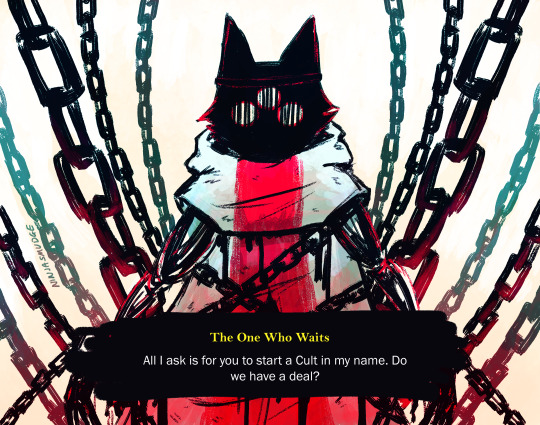
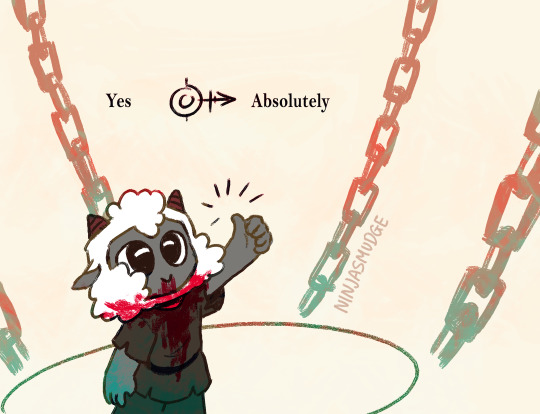

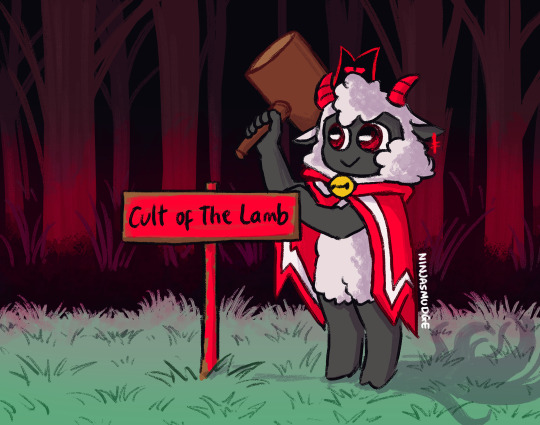
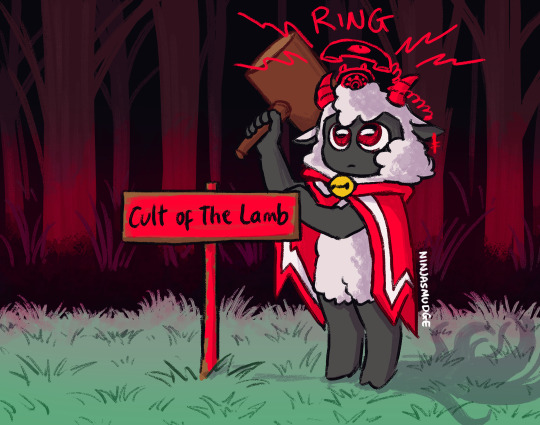

thats a red flag narinder, get that crown back while you still can
+ top panel without text below the cut
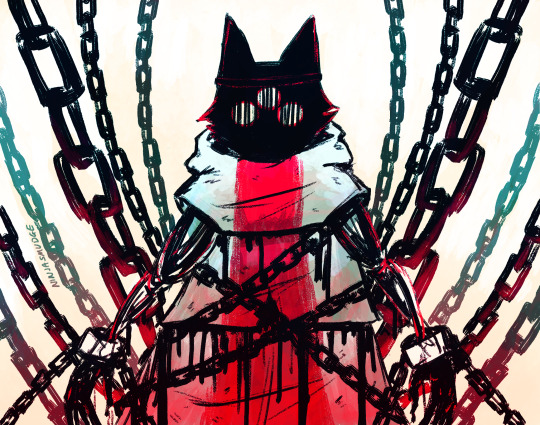
#cult of the lamb#cotl#rspect my privacy at this time by not asking what came over me to make a fully colored comic#cotl narinder#cotl lamb#cotl aym#my art#actully im like really proud of this not sure why it happened but it did#anyway i have at least another 4 cotl jokes to get out right now#if you look real close you can see my hcs for lambs design before and after they got the red crown#and also i need everyone to notice aym and lambs eldrich shadow#and yes i know you can both name the cult anything AND you can have a cult in someones name with it being their cult but consider. funny#narinder
9K notes
·
View notes
Text
POV: You're on Gothamtwt




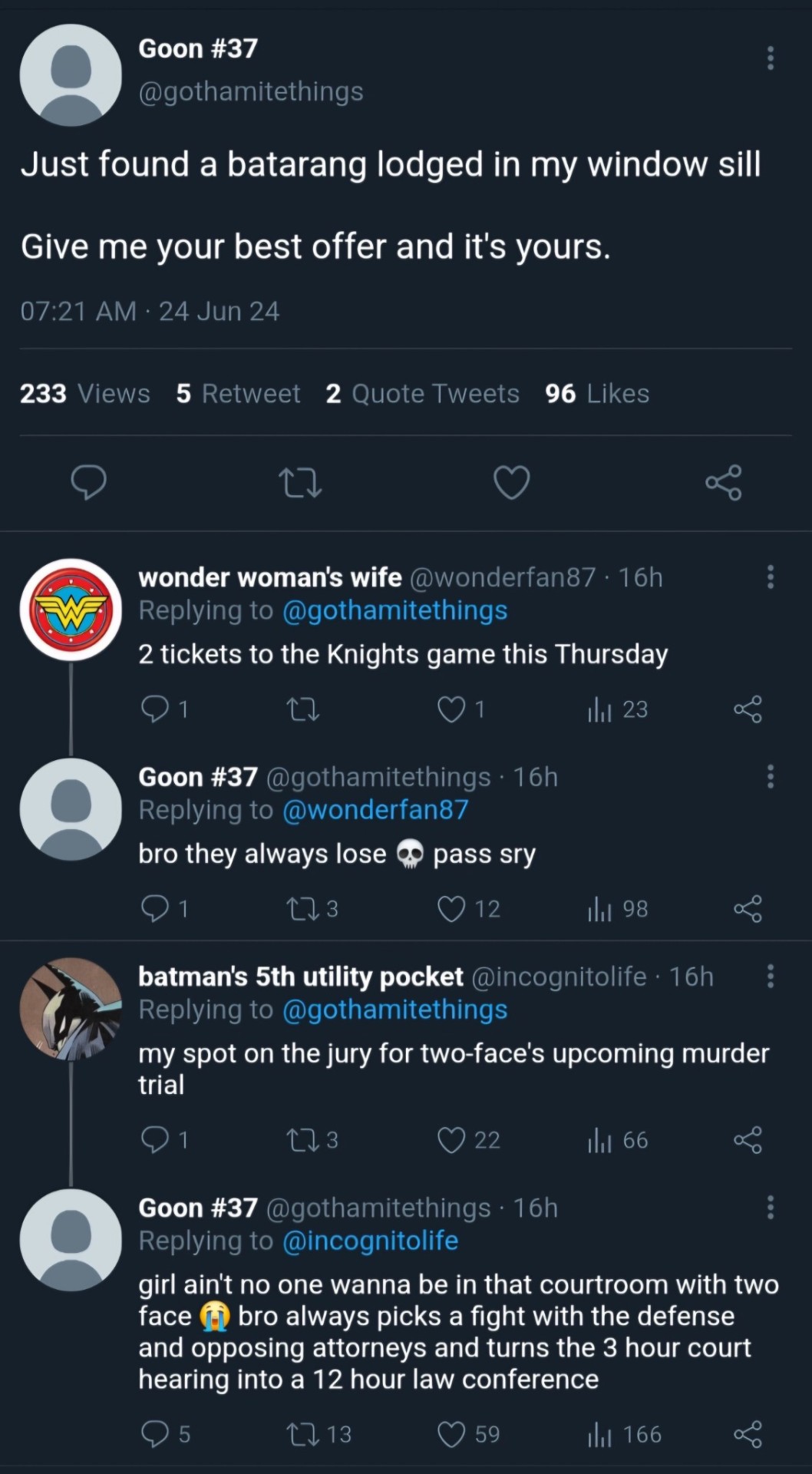



just gothamite things
<- Prev Masterlist Next ->


#a person could literally explode in broad daylight & gothamites would just b like: wow crazy. anyways#ppl from other cities shit talk gothamites all the time but lets be real theyre probably the most durable kind of ppl#fucking brainiac could come down and threaten gotham & the citizens would just be like 'ok lol do ur worst'#every week u'll see a different piece of bat paraphernalia get auctioned off on twitter & the entirety of gotham treats it like a sport#social media au#dc comics#nightwing#dick grayson#barbara gordon#oracle#jason todd#red hood#stephanie brown#spoiler#damian wayne#robin#black bat#cassandra cain#batfam#batfamily#batkids#batman#bruce wayne#incorrect quotes#texts#tweets#twitter#crack#fanatical posting
5K notes
·
View notes
Text

Breaking News: Gotham Crime lord and Child Vigilante Accomplice Harass Innocent Taco Bell Employee (NOT CLICKBAIT)
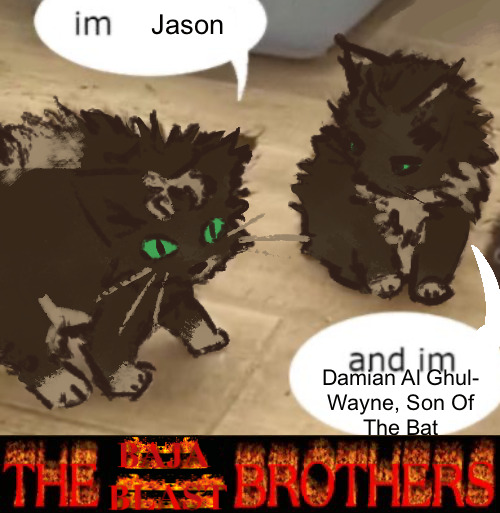
Those dastardly Baja Blast Brothers
#the cutest duo ever 2 me#if you see me struggling with tumblr mobile no you dont#batman#dc robin#dc fanart#dc comics#art#bat family#jason todd#batfam#red hood#robin#dc red hood#gif#artists on tumblr#animation#damian wayne#damian wayne robin#batfam fanart#bat fam#artist on tumblr#damian al ghul#fanart
4K notes
·
View notes
Text




Biker soap babyyyyy
#oh yeah and his boyfriend#forgot about him for a bit#sorry it's hard to see thing when there's a smile so bright in front of me#that was cringe sorry#anyway red suits him#we should make soap wear red more#john soap mactavish#simon ghost riley#call of duty#ghostsoap#call of duty mwii#ghost x soap#ghoap#soapghost#my art
3K notes
·
View notes